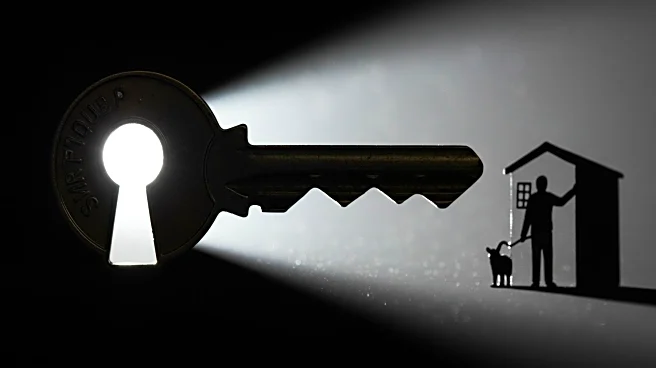What's Happening?
President Trump has issued an executive order titled 'Ending Crime and Disorder on America’s Streets,' which aims to shift homeless individuals into long-term institutional settings for treatment through civil commitment. This approach is described as 'new,' 'compassionate,' and 'evidence-based,' but critics argue it is none of these. Historically, institutionalization of people with mental illness in the U.S. has been fraught with poor conditions and inadequate care. The order also directs agencies to end support for 'housing first' programs, which provide housing without requiring sobriety or treatment. These programs have been shown to save government costs and provide stable housing benefits, but the executive order suggests a shift away from this model.
Why It's Important?
The executive order has significant implications for public policy and the treatment of homelessness in the U.S. Critics argue that institutionalization could lead to increased criminalization of homelessness, as the order pressures jurisdictions to prohibit 'urban camping.' This could result in more homeless individuals being incarcerated rather than receiving necessary support. The 'housing first' approach, which the order seeks to dismantle, has been proven to reduce healthcare costs and judicial involvement, offering a cost-effective solution to homelessness. The shift away from this model could lead to increased costs and reduced autonomy and security for homeless individuals.
What's Next?
The executive order's call to expand mental health and drug courts may offer some positive outcomes, but the broader implications of the order could lead to increased criminalization of homelessness. Stakeholders, including civil rights groups and public policy advocates, are likely to challenge the order, arguing for the continuation of 'housing first' programs. The political and social debate surrounding homelessness and public safety is expected to intensify as the order is implemented.
Beyond the Headlines
The ethical implications of institutionalizing homeless individuals are profound, raising questions about civil rights and humane treatment. The historical context of institutionalization in the U.S. suggests potential for repeating past mistakes, where individuals were subjected to poor conditions and inadequate care. The executive order's approach may also reflect broader societal attitudes towards homelessness and mental illness, highlighting the need for compassionate and evidence-based solutions.









